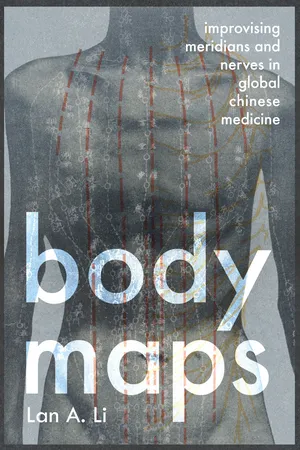
- English
- ePUB (mobile friendly)
- Available on iOS & Android
About this book
A historical and cultural study of how representing invisible anatomical structures has reshaped our understanding of human anatomy.
In Body Maps, Lan A. Li unveils a rich history of the hidden landscapes of the human body. This compelling study explores the world of "invisible" anatomy, explaining how hand-drawn body maps have shaped our understanding of the human form across cultures and centuries. From the meridian charts in East Asian medicine to neurophysiological illustrations, Body Maps traces the evolution of anatomical representation from the tenth to the twentieth centuries. Drawing on case studies across time and place, from Kaifeng to Dejima and from Beijing to Berlin, Li expertly navigates the complex interplay between Eastern and Western medical traditions. At the heart of this history remains a perennial mystery: How did representations of jingluo (meridians) become intertwined with—and sometimes subsumed by—concepts of nervous anatomy? By examining the graphic history of these invisible structures, Body Maps challenges our assumptions about the stability of medical knowledge and invites us to reconsider the nature of anatomical "reality." Each chapter opens with a single image and explores how practitioners negotiated between materiality and metaphor, with the nature of the body and the symbols used to represent it. Body Maps is a thought-provoking exploration of how images shape our understanding of the world. By bringing together insights from the history of science, postcolonial studies, art history, Chinese studies, critical cartography, and medical anthropology, Li offers a fresh perspective on the cultures of objectivity that have defined our approach to the human body.
Frequently asked questions
- Essential is ideal for learners and professionals who enjoy exploring a wide range of subjects. Access the Essential Library with 800,000+ trusted titles and best-sellers across business, personal growth, and the humanities. Includes unlimited reading time and Standard Read Aloud voice.
- Complete: Perfect for advanced learners and researchers needing full, unrestricted access. Unlock 1.4M+ books across hundreds of subjects, including academic and specialized titles. The Complete Plan also includes advanced features like Premium Read Aloud and Research Assistant.
Please note we cannot support devices running on iOS 13 and Android 7 or earlier. Learn more about using the app.
Information
Table of contents
- Cover
- Title Page
- Copyright Page
- Dedication
- Contents
- Preface
- Introduction
- 1. Representing Meridians and the Mind
- 2. Early Modern Metaphors as Translation
- 3. The Limits of Anatomy through Tu (圖)
- 4. Generic Maps and the Failure of Standardization
- 5. Modern Mediations in Difference and Diplomacy
- Epilogue
- Acknowledgments
- Glossary A. Key Concepts
- Glossary B. Other Sinographic Terms
- Notes
- Bibliography
- Index